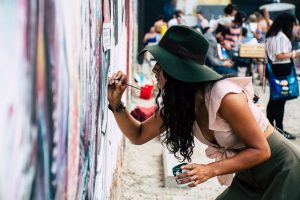In a ground-breaking decision, U.S. District Judge William Orrick of San Francisco rejected the arguments made by a group of artists against generative artificial intelligence companies. The case, Andersen v. Stability AI Ltd., 3:23-cv-00201, centers on allegations of copyright infringement and marks the first time that courts are examining the extent of AI's impact on intellectual property rights.
Illustrator Sarah Andersen's claim against Stability AI has been deemed likely to withstand the initial dismissal plea. The artists, also including Kelly McKernan and Karla Ortiz, have accused Stability AI of using their copyrighted works without permission, alleging that the company "scraped" billions of internet photos to train its Stable Diffusion text-to-image engine. The AI system reportedly generates images in the artists' unique styles, leading to claims of copyright infringement.
However, Judge Orrick did not dismiss the case entirely. He advised the artists to clarify their claims against Stability AI, Midjourney, and DeviantArt and provide additional supporting facts. Orrick emphasized the need for more evidence to establish a plausible connection between the artists' works and the AI-generated output. The court recognized that the algorithms used by the defendants were trained on a vast dataset of five billion compressed images, raising questions about the possibility of direct involvement with the artists' works.
Furthermore, Orrick expressed doubts about the artists' allegation that the images produced by the AI systems, based on text prompts containing their names, infringed upon their copyrights. The judge found the claim lacking substantial similarity between the artists' original works and the AI-generated outputs.
The case has broader implications, as it offers the first glimpse into a series of similar lawsuits targeting technology giants like Microsoft, Meta, and OpenAI over their generative AI training content. These lawsuits focus on the companies' use of enormous amounts of data to train their AI systems, with plaintiffs arguing that their copyrighted works are being unlawfully exploited.
For illustrators like Sarah Andersen, this ruling serves as a promising milestone, potentially holding generative AI companies accountable for the unauthorized use of copyrighted materials. Judge Orrick's willingness to allow the artists to submit a new complaint indicates that the court is taking this matter seriously and recognizes the significance of addressing the intersection between AI technology and intellectual property rights.
As the case progresses, it remains to be seen how the artists will bolster their claims against Stability AI, Midjourney, and DeviantArt, while the defendants will likely present their defenses. The court's final decision could set important precedents for the future of AI development and copyright protection.
This lawsuit marks an essential moment in the ongoing debate surrounding the responsible use of AI technology, emphasizing the need for clearer regulations and guidelines to safeguard the rights of content creators.






















